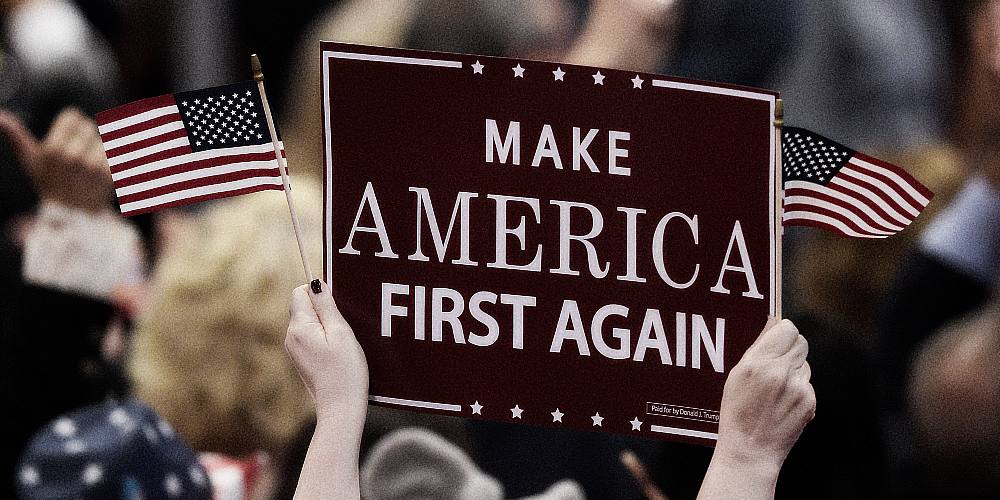Nationalism has become the great bugaboo of global talking heads today. It is discussed in the marbled halls of Western capitals as a scourge that must be eliminated just as swiftly as its equally detested cousin, populism. Policies that are popular with the people and nation-states that reflect the self-determination of the people cannot be permitted!
Who says? Some very important people who belong to august bodies such as the European Commission, the United Nations, the Bank for International Settlements, the World Economic Forum, and the World Health Organization. International groups with lofty reputations have no time to trifle with the beliefs and needs of discrete peoples. The globalists are here to save democracy by ridiculing and rejecting whatever the people might want!
Sounds a little bit like an absolute monarchy, does it not? The public is not in the mood for another round of COVID lockdowns. Who cares? — it’s what the WHO director commands! Citizens are extremely unhappy with the attendant crime, cultural conflict, and expanded welfare obligations that come with rampant illegal immigration. So what? — the unelected bureaucrats at the E.C. and the U.N. are committed to destroying national identities! Westerners demand an end to money-printing and runaway inflation. Who asked them? — we do what the multinational investment firms say!
What we have today are kings and queens who sit on distant thrones and bark orders at the common people living under their rule. Those who object to being ruled are condemned as “extremists,” vulgar “populists,” and bigoted “nationalists.” From the royalty’s point of view, anyone who represents the people is a threat to the globalist monarchy’s continuing reign. Populists and nationalists, you say? Egad, off with their heads!
Why can’t the French, Dutch, British, German, Polish, Swedish, Italian, Spanish, Australian, Canadian, and American governments represent their own peoples? Because those territories are too small for their designs. Today’s “elites” have global domination on their minds. The concerns of individual nation-states are too petty for those who covet the whole planet.
We used to have a pretty good word to describe an arrangement in which many separate countries are forced to bend the knee and pay tribute to a superior power: empire.
Every empire’s defenders describe its institutions as absolutely necessary for promoting social cohesion, economic growth, and political stability. Respect for authority and the hierarchical order is touted as essential for civilization. But we are not living in the age of Caesar Augustus, Charlemagne, or Kublai Khan. Must a small collection of global “elites” really keep distinct nations under their thumbs in order to keep the peace? Not if immediate history is any guide. Peace isn’t what empires do! They command…until they are opposed by those who refuse to be conquered or until they are resisted from within by those no longer willing to obey.
During the twentieth century alone, many great empires clashed and died. The First World War brought an end to the Austro-Hungarian Empire, the German Empire, the Ottoman Empire, and the Russian Empire. The Second World War brought an end to the Japanese Empire, the German Reich, and the Kingdom of Italy. In the aftermath of those global conflagrations, independence movements emerged in overseas territories once administered by the United Kingdom and France and set in motion decades of decolonization across Africa, the Balkans, the Middle East, and Asia. The combined results produced dozens of new nation-states around the globe.
Some had existed as kingdoms, tribes, or proto-nations earlier in their respective histories, whereas others materialized as products of diplomatic wrangling among peace negotiators partitioning military maps. The trend, however, was clear: cultural and ethnic groups all over the planet sought independence from the much larger empires that had once swallowed them whole. Following two horrific wars that had claimed hundreds of millions of lives to bloodshed, disease, genocide, and famine, the mid-twentieth century witnessed renewed calls for national self-determination, political statehood, and local decision-making.
Those calls were often ignored. For millions of Eastern Europeans trapped behind the Iron Curtain, WWII did not really come to an end until the fall of the Berlin Wall and the collapse of the Soviet Union nearly fifty years later. The rise of communism in Asia divided China, Korea, and Vietnam and left most of the continent in various stages of civil war to the present day. For those unlucky enough to have lived through the ethnic slaughter of the Yugoslav Wars in the ’90s, the Great War that began in 1914 lingered for most of the twentieth century.
In contrast to the proliferation of nation-states, the last century also produced a new kind of empire: the global superpower. The United States and the Soviet Union faced off in a simmering Cold War that could have easily exploded into a third world war at any time, and their respective military alliances — the North Atlantic Treaty Organization and the Warsaw Pact — stretched their tentacles across continents and oceans. While the U.S. and the USSR treated the world as a chessboard and nation-states as game pieces belonging to one side or the other, national independence movements often became little more than smokescreens for proxy wars between the world’s two dominant empires. Under the shadows of the global superpowers, many fledgling nations were relegated to the status of client states — vassals doing their hegemons’ bidding.
The twentieth century’s clash of empires gave the world carnage and chaos that surpassed that of any other century and left humanity on the knife-edge of total destruction during a Cold War that carried the prospect of nuclear Armageddon. From such savagery and perpetual angst, several obvious lessons could be gleaned: empire-building leads indubitably to empire collapse. Likewise, when empires fall, people all over the planet suffer. Finally, anything in this world that is “too big to fail” represents a threat to everyone. Those lessons apply equally to financial as well as political Leviathans.
A rational person might well conclude that concentrated power and centralized government are the essential ingredients for future public resentment, social instability, and revolution. An impartial observer might similarly conclude that unrepresentative government leads to the abandonment of protections for individual human rights and the concomitant growth of brute totalitarianism. Finall
How strange it is, then, that twenty-first-century global powers demonize nation-states as antiquated political entities detrimental to world peace and their defenders as xenophobes not worthy of recognition?
Most of Western Europe cheered the fall of the Third Reich because a continent of distinct nations with unique cultures and cherished histories did not want to become conquered vassals of the Nazi regime. Eighty years later, those same European nations have become part of a continental union that promotes endless immigration from competing civilizations and recognizes Germany as its unofficial head. Similarly, eight years after the British people voted for national sovereignty over European Union membership, several iterations of U.K. governments have watered down the intended effects of a real Brexit. And the United States has spent the post-war period building a NATO military alliance, international financial institutions such as the IMF and World Bank, and a labyrinthine system of “free trade” agreements — all meant to buttress what the U.S. government and its allies affectionately call the “rules-based international order.”
It would seem that two world wars and a debilitating Cold War did nothing to dissuade global “elites” from building a new empire on the ashes of the old. It will surely suffer a similar fate.
- Gold SKYROCKETED during Trump’s first term and is poised to do it again. Find out how Genesis Precious Metals can help you secure your retirement with a proper self-directed IRA backed by physical precious metals.



